CLAS 353
October 31, 2024
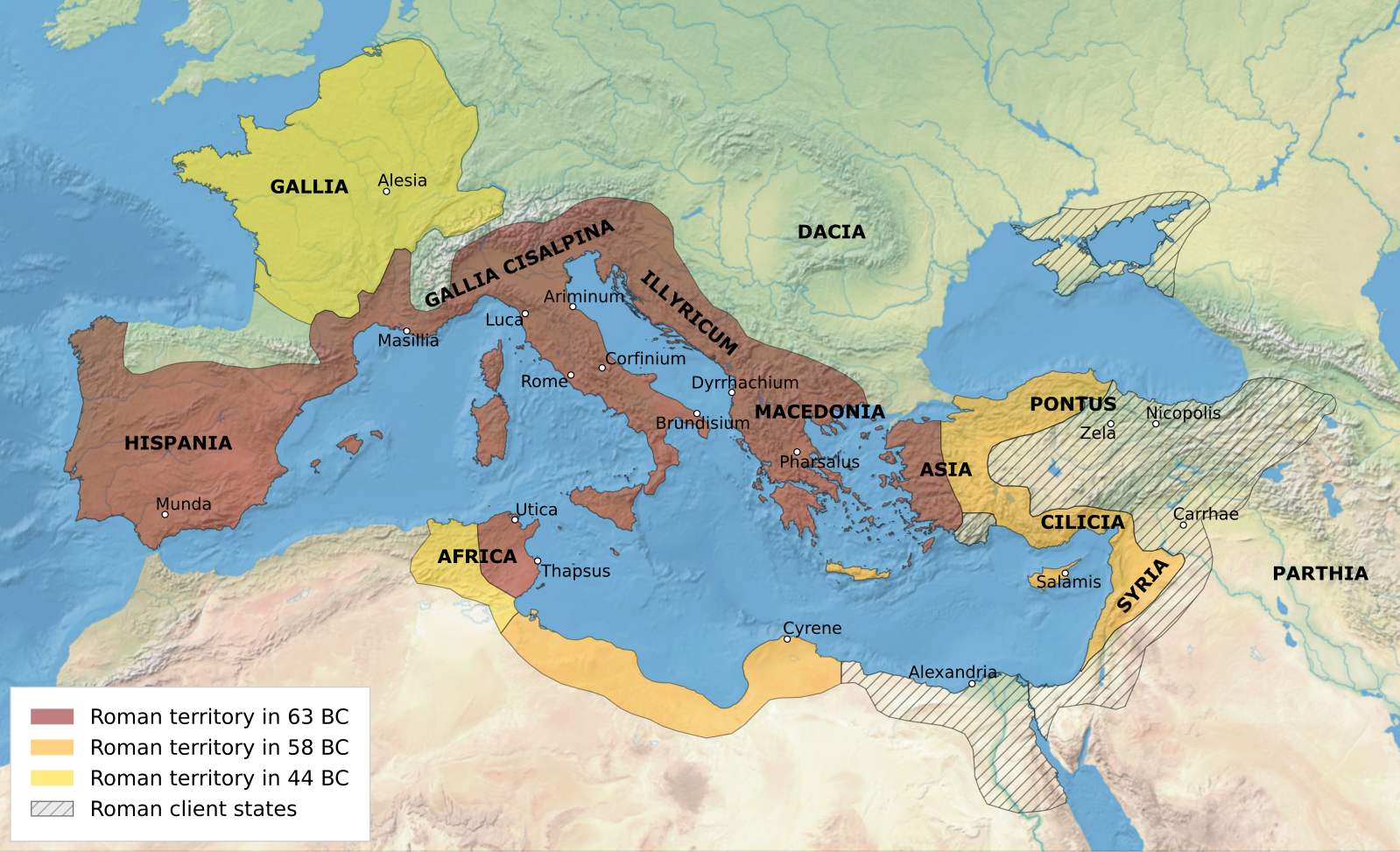
Pima County early voting information
Examination #2 Study Guide
Civil War 4-5: fighting shifts to Spain and elsewhere; Caesar survives mutiny; appointed consul & dictator at Rome; sets sail for Greece from Brundisium
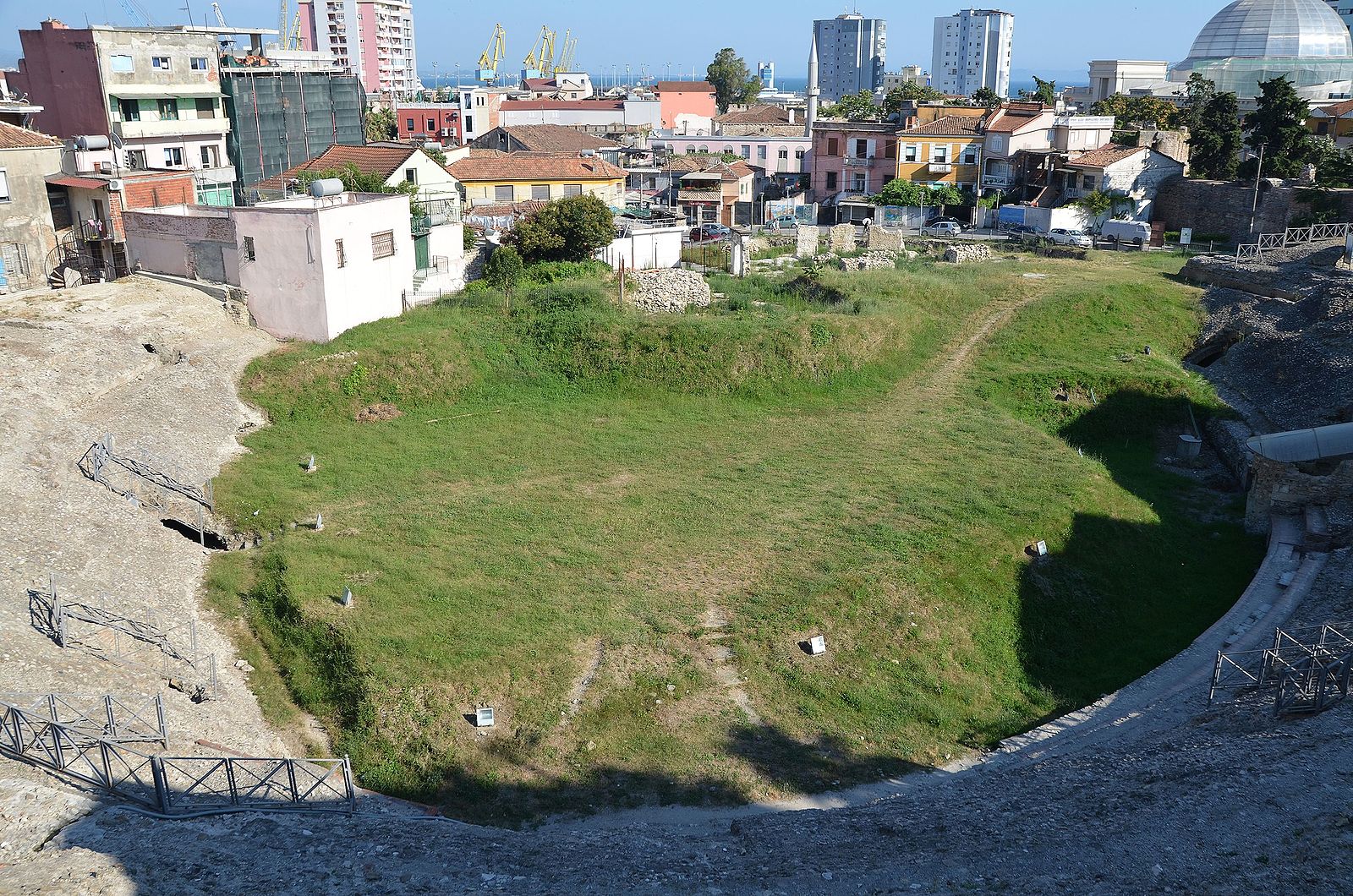
Roman amphitheater at Dyrrachium (Durrës, Albania; 2nd century CE)
Civil War 6 (48 BCE) summary: armies battle at Dyrrachium (fortified city on cliffs, Caesar's ramparts); Pompey's forces walled in but advance; Caesar's retreat to Thessaly ("O Rome!— / You could have been happy and free from tyrants . . .", 6.313ff.) > land of myth & monsters (Lucan's delays!), appropriate venue for civil war ("Even the land is complicit", 6.460)
.png)
- Scaeva (Dyrrachium): Caesar's raging superhero ("Prone to every wickedness, he didn't know / That bravery was the greatest crime in civil war", 6.154-5); aristeia against Pompey's army ("An army against a single man . . . Nothing guards his naked guts / Except the spears standing fixed in his bones . . . Single handedly / he rushes to receive all of war's many wounds, / Carrying in his breast a dense forest of spears . . .", 6.199ff.)
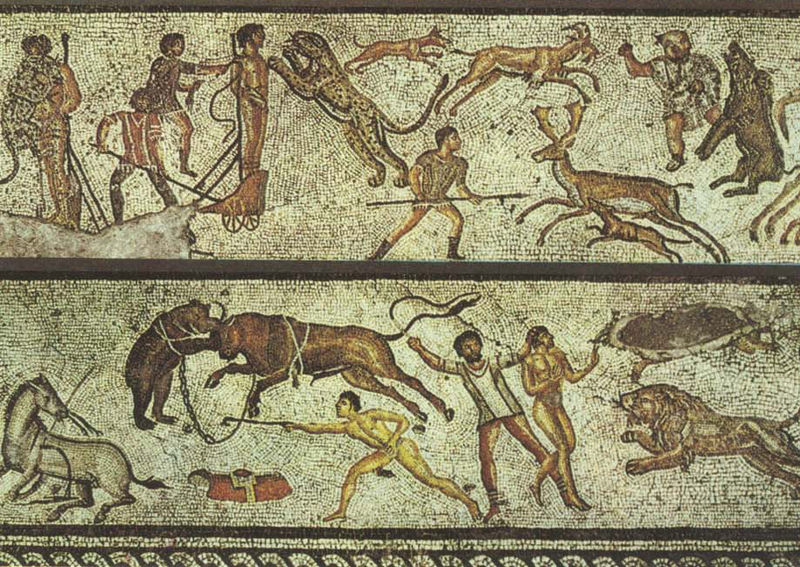
Amphitheater scenes on a Mosaic (Tripoli, Libya, 1st century CE)
Civil War 6.224-34 (Scaeva & grotesque theater of war; cf. Roman spectacle)
From afar, a Cretan shaft is aimed at Scaeva.
Flying surer than any prayer could hope,
It strikes his head, piercing into his left eyeball.
Snapping muscles and ligaments with the weapon,
He rips the arrow out, his eye still clinging to it,
And tramples both, unflinching, into the ground:
No different, a Pannonian bear, when a Libyan
Has launched his javelin with a little thong,
Wheels in the theater to rage at her wound, attacking
The weapon that struck her, circling after the spear
Stuck in her side.
- Pompey allows Caesar's retreat to Thessaly, refuses to return to Italy – Lucan's rehabilitation of Pompey begins
- Thessalian digressions: land of memories, deep time (myth: Achilles, Medea, Gigantomachy, Centaurs) & monstrosities (rivers, mountains, witches)
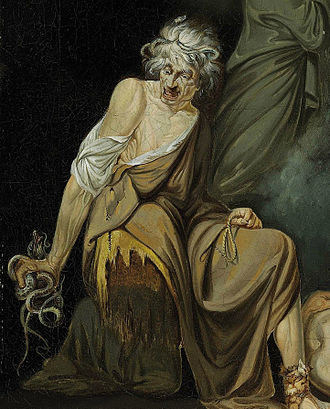
Mortimer, Sextus Applying to Erichtho (1776)
- Sextus Pompey: consults Erichtho about fortune: rejects upperworld oracles & gods (". . . the wretch / Clearly saw that Heaven's powers had no clue . . . The place itself fed his cruel and empty rage, / As did the the cities full of witches beside the camp", 6.454ff.); cf. Sibyl & Anchises in Aeneid 6
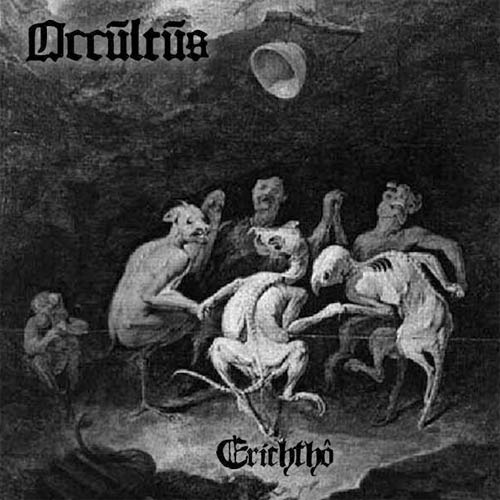
Columbian black metal band Occultus' "Erichtho"
- narrator's long excursus on Thessalian witches' powers & Erichtho:
– control of corpses, reversals/inversions of nature, life/death ("Are all the gods in thrall to their foul powers . . .?", 6.522; "All human death is useful", 6.589)
–
Erichtho the epic's strongest supernatural force: voice "a dissonant murmer of scrambled feedback / Utterly unlike human speech . . ., 6.721-ff.;"hovers over well-loved limbs, and plants kisses, / And mutilates the head, opening its sealed mouth / With her teeth" (6.593-5); threatens Furies, Persephone & Dis (6.772ff.)
–
katabasis or necromancy? ("For though the hag / Can overpower Fate, no one knows whether she sees / Stygian ghosts after dragging them to her cave / Or after going down to Hell itself", 6.685-8)
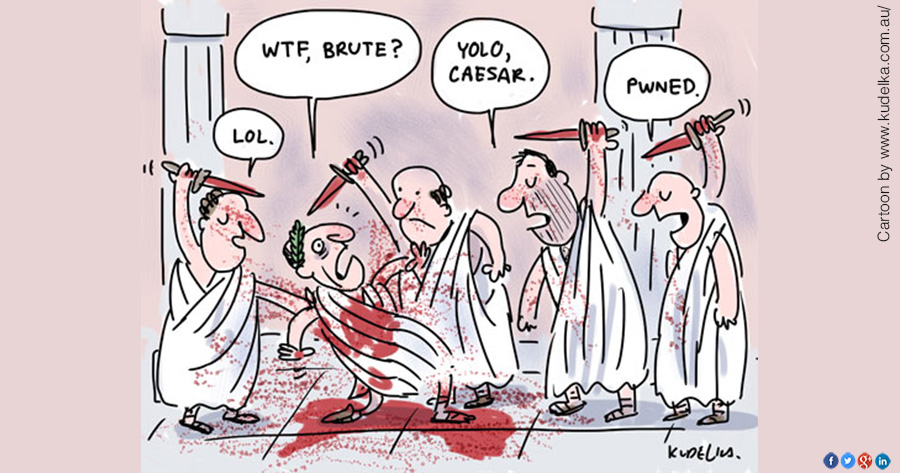
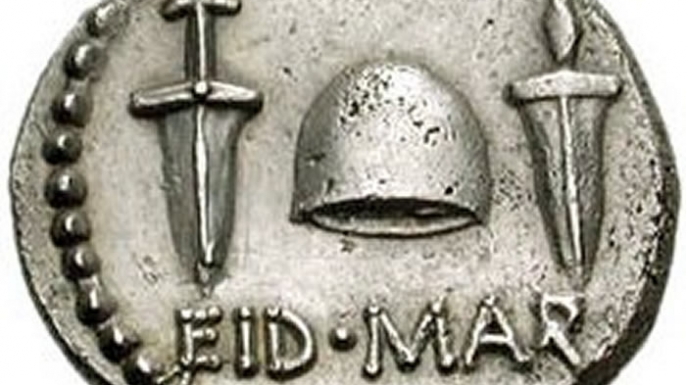
R: Ides of March silver denarius minted by Brutus (43/42 BCE)
- reanimated corpse's report of discord among dead Romans (class struggle: sad aristocratic heroes (e.g. Cato the Elder) vs. exultant populist revolutionaries (e.g. Gracchi, Catiline, Marius) – "Among the holy shades, I saw only Brutus / Rejoicing . . .", 6.839ff. [first consul of Roman Republic, 510 BCE]) – anti-Aeneid elements?
Civil War 6.849ff. (corpse's vague prophecy; personal fortune-telling vs. Roman imperial destiny)
"And the Stagnant Realm's Lord now throws open
His pale abodes, and sharpens broken stones
And hard steel for shackles, preparing to punish
The victor. But take this comfort with you, boy—
The dead have set aside a quiet realm for your father
And his house, and a space has been made ready
For Pompey's whole line in our land's clear kingdom.
And don't be troubled by this life's short glory.
An hour is coming to level all Rome's warlords . . .
. . . Only this is uncertain—
Whose tombs the Nile or the Tiber will touch.
Battle, for the rivals, will only decide their graves.
But don't ask me about your fate, for the Sisters
Will make things clear, though I'm silent now,
And your father Pompey will fill you in,
A surer prophet in Sicily's fields . . ." [ghost in lost book of Civil War?]
- corpse dies again, Sextus & Erichtho return to Pompey's camp at nighttime ("she bid dark night to restrain / The daylight", 6.881-2) – battle to commence in Civil War 7
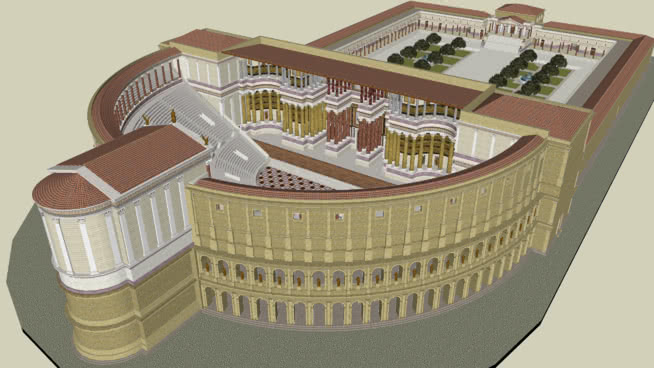
Reconstruction of Theater of Pompey in Rome (55 BCE)
Civil War 7 summary: Pompey's nostalgic dream (7.9ff.) of his theater & narrator's lament for lost public funeral; pre-battle speeches by warlords (Pompey slow to act; Caesar impious ("Even if you see parents / In the enemy's ranks, mutilate their sacred faces / With your steel", 7.342-4); battle of battles at Pharsalus (Pharsalia) in Thessaly
- narrator's despair as battle begins (August 9, 48 BCE): Rome's lost liberty & indifference of gods; bleak vision of future & recurrent nightmare of Roman history
Civil War 421ff. (civil war's "deep time" effects – the undoing of Rome's destiny)
Their sword-hands will accomplish the unthinkable.
They'll inflict wounds that no future age can heal,
Though it be free from war forever. Their battle
Will bury unborn races, sweeping aside an entire
Generation of people yet to be born to the world . . .
. . . And Liberty,
Shunning civil war's atrocities, has fled
Beyond the Tigris and Rhine, to never return
No matter how much blood we spill for her.
Civil War 7.491ff. (human revenge for gods' indifference)
Without doubt we have no gods . . .
. . . No—the gods don't care about mortal affairs!
Yet we'll get our revenge, as much as we can,
Civil war will make emperors equal to gods above,
And Rome will deck out the dead with halos,
Thunderbolts, and stars, and will swear oaths
On Caesars' shades in the temples of the gods.
- narrator at war with himself/task
Civil War 7.612-17
O mind! Flee this part of war
And leave it in darkness forever! Let no age
Come to learn such horrors from my pen,
Or how much license is granted in civil war.
Better that these tears and protests perish.
What Rome did in this struggle I'll never tell.
GROUPS
Civil War 7.687-716 (anti-epic carnage at climax of battle; an anti-aristeia)
When the whole world is dying, it's shameful
To waste tears on countless deaths, to follow
individual fates and ask through whose guts
Each death-stroke passed, or who trampled
His own entrails as they spilled on the earth;
Who looked his foe in the face and thrust
Sword from throat with his dying breath;
Who toppled when stricken, and who stood tall
As his limbs fell about him. It's shameful
To seek whom spears passed through, and whom
They fixed to the plain; whose blood burst
From veins into air and drenched the arms
Of his enemy; who hacked his brother's breast
And cast his severed head away to plunder
The corpse; who mutilated his father's features
With brutal rage to convince his watchers
That he hadn't just butchered his parent.
No death alone deserves its own lament,
And we don't have time to mourn individuals.
Pharsalia wasn't like any prior battle's catastrophes:
There Rome perished through men's deaths,
Here through entire peoples'. Not soldiers,
But whole nations died. Here blood streamed
From all Greece and Pontus and Assyria—
Before a huge flood of Roman gore stopped it
From scabbing over the plains. This battle
Wounded mankind
worse than any one time
Could take. And more than life and safety died.
The entire world was made prostrate forever.
These swords damned every later age to slavery.
- Pompey flees rout ("It wasn't battle: / One side raged war with swords, the other / With bare throats", 7.591-3; Lucan's spin, "And once you left the war / The dying Senate showed it had fought for itself,", 7.781-2; "It was worse to win", 7.792)
- Caesar's morning-after Breakfast of Champions
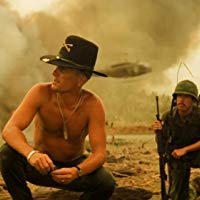
Lt. Col. Bill Kilgore (Robert Duvall), "I love the smell of napalm in the morning", Apocalyspse Now (1979)
Civil War 7.879-901 (Caesar on the battlefield after the decisive battle)
Despite these sufferings,
When clear daylight unveiled Pharsalia's losses
Caesar's eyes were glued to the deathly fields.
The look of the place doesn't stun him. He sees
Rivers rushing with gore and massed corpses
Piled high as hills. He watches the heaps settle
Into corruption, counting Pompey's allied people.
And a place is set for his breakfast from where
He can note the faces and features of the dead.
He likes not seeing Thessaly's lands, and scanning
With his eyes fields buried beneath the carnage.
He sees his fortune and his gods in the blood.
And loathe to lose his crime's pretty spectacle,
He refuses, in a fit of rage, to grant the wretched
To the pyre's flame, and thrusts the sight of Thessaly
On guilty heaven. The Carthaginians buried a consul,
And Libyan torches stoked Cannae's flames; [Aemilius Paullus, Hannibal's victory in 216 BCE]
But not even this can force Caesar to act human
Towards his enemy. His rage still hasn't savored
Enough slaughter, and he remembers the dead
Were fellow citizens. O Caesar! It's not single pyres
We're after, or separate graves. But grant one fire,
At least. Let nations burn with indiscrete flames.



.png)






